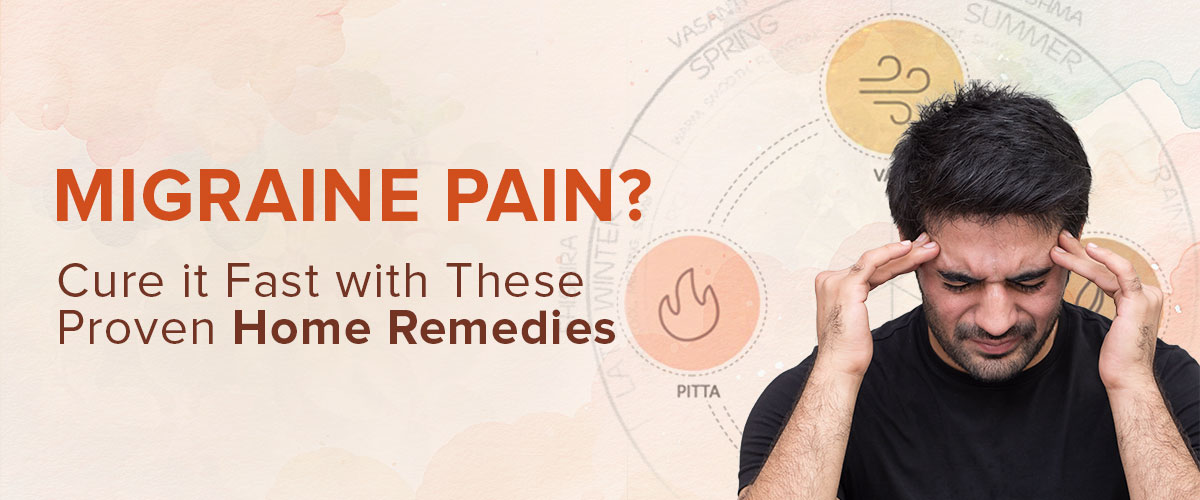Home remedies for Migraines

Throbbing pain, nausea, and light sensitivity - all at once, this is when you know it’s a migraine coming your way. No warning signs, leaving you almost helpless, migraines could last for hours if not attended to. During such weak moments, many people often resort to painkillers. Well, that’s not necessarily the best idea. Though painkillers can provide instant comfort, their long-term risks and side-effects can’t be underestimated. Thankfully, there are some helpful home remedies for migraines that can not only alleviate the symptoms but also possibly prevent future attacks.
What is a migraine?
Firstly, it’s most important to know that a migraine is much more severe than any typical headache. Unlike a headache, which is usually mild and dull, a migraine feels like a throbbing and pulsating pain on one side of the head. Migraines are also frequently accompanied by other disrupting symptoms.
Common symptoms of migraines include:
- Severe, throbbing or pulsing head pain
- Nausea and vomiting
- Sensitivity to light
- Sensitivity to sound
- Visual disturbances like flashing lights or zigzag patterns
What causes a migraine?
Migraines are classified as a neurological condition. While their precise cause is still unclear, they are often thought to be caused by a number of reasons such as:
Family history: Migraine tends to run in families, suggesting a genetic predisposition. Certain genes may influence how your brain processes pain and trigger migraine attacks.
Brain chemical imbalance: Migraines can be triggered by imbalances in brain chemicals, especially serotonin. When serotonin levels drop, it affects blood vessels in the brain, leading to pain and other migraine symptoms.
Triggers: Certain external factors can trigger a migraine in individuals who are genetically predisposed. Common migraine triggers include: stress, certain foods or medications, environmental factors and weather changes.
Hormones: Hormonal changes can result in migraine attacks, particularly in females. These can occur during menstruation, pregnancy, menopause, and if you are taking too many oral contraceptives.
Sensory overload: Some people can experience a migraine attack when they are exposed to bright lights, strong smells or loud noises. This happens because sensory overload can impact the neurological system and trigger migraines.
Physical factors: Physical exertion (such as vigorous exercise), bad posture, or tension or strain in the muscles of the neck and shoulders can result in a migraine in some people.
Home remedies for migraine
Home remedies for migraine offer a subtle, more holistic approach to dealing with it, addressing both the pain and underlying triggers. Let’s explore some of the most trusted natural solutions that will help ease your migraine discomfort:
Peppermint oil: The cooling properties of this oil might ease the pain by calming the muscles surrounding the head and neck. Use peppermint oil by lightly massaging a few drops over your temples. Inhaling the aroma of peppermint oil can also bring relief. To prevent skin sensitivity, always dilute essential oils with a carrier oil, like coconut oil.
Lavender oil: Those who suffer from migraines brought on by stress or anxiety may find lavender oil especially helpful due to its well-known calming and relaxing qualities. Studies have shown that inhaling lavender oil can reduce migraine symptoms. You can apply a few drops of lavender oil to your wrists or temples, or spread it throughout the house
Ginger: Ginger is known for its anti-inflammatory and anti-nausea properties, and nausea is a common symptom of migraines. You can have raw ginger, ginger tea, or ginger ale made with real ginger. You can also try applying ginger oil topically to the back of your neck or to your temples.
Hydration: Did you know? Dehydration can trigger a migraine attack as it can lead to a drop in blood volume, which may exacerbate headache symptoms. So, you must stay hydrated throughout the day. You can have electrolytes, coconut water or fresh juices. This is one of the most effortless home remedies for migraines.
Cold or warm compress: Cold compresses help to numb the pain and reduce inflammation in the affected area, whereas warm compresses help relax tensed muscles. Use an ice pack wrapped in a towel for a cold compress or a warm washcloth for a heat application.
Relax in a quiet, dark room: It’s important to rest in a calm environment, if you are experiencing a migraine attack because they can be aggravated by bright lights and loud noises. Lie down in a peaceful room, to relax your mind and try using a sleep mask to block out light.
Herbal teas: Certain herbal teas like chamomile, valerian root, lemongrass can leave a soothing effect and help reduce the intensity of migraines or prevent them from occurring. These teas can potentially reduce the likelihood of migraines triggered by stress.
Caffeine: If you love a cup of hot coffee, you'll be so happy to know that it might actually help with migraine relief. A small amount of caffeine can reduce migraine pain by constricting blood vessels, which helps control the throbbing sensation. But you must remember that moderation is key.
Lifestyle and diet recommendations for migraine
We often read and hear about how important lifestyle and dietary changes are when it comes to staying healthy, and similarly, they are just as crucial for managing migraines. The frequency and intensity of migraine attacks can be significantly reduced by making small changes to daily routines, sleep patterns, food, and stress management.
Stick to your sleep schedule Migraines can be brought on by irregular sleep habits, sleep deprivation, or oversleeping. Maintaining a regular sleep schedule lowers your risk of migraine attacks by regulating your body's internal clock.
Learn to de-stress: One of the most common causes of migraines is stress. Include stress-relieving practices in your daily routine, such as yoga, meditation, deep breathing techniques, or frequent exercise. Planning a getaway occasionally to relax is also a good idea. Additionally, you must also take regular breaks throughout the working hours.
Stay active: Regular physical activity can reduce the frequency of migraines by promoting overall well-being. It helps relieve tension in the muscles, which can otherwise trigger migraines. Engage in low-impact exercises like walking, swimming, or cycling. Remember to start slowly and gradually increase the intensity to ensure it does not get too hard for your body.
Balanced diet: Eating a range of meals high in nutrients will help prevent migraines and promote general health. Incorporate foods high in magnesium (such as avocados, spinach, and almonds), omega-3 fatty acids (found in salmon and other fish)
Limit screen time: In some cases, prolonged exposure to bright lights or screens can cause migraines. You can simply avoid a migraine attack by limiting screen time or taking frequent breaks, and ensure that your eyes are getting enough rest and are not strained out.
Maintain a healthy weight: Research has indicated that being overweight may make migraines more likely to occur and even increase the severity. Thus, it is important to maintain an ideal body weight through a balanced diet and frequent exercise.
With these proactive steps to manage migraines, you can not only get significant relief but also improve your quality of life. The key is to pay attention to your body’s signals, remain consistent in your approach, and try different remedies to discover what works best for you.



 Prev
Prev

































































